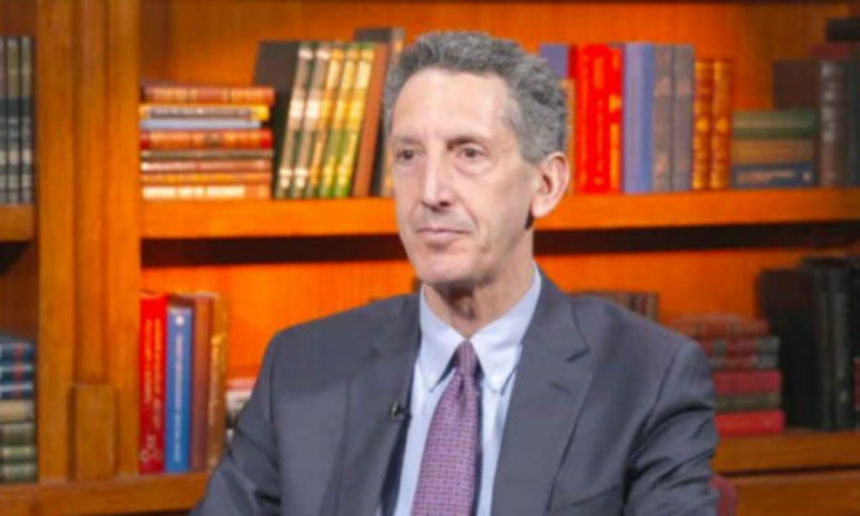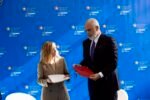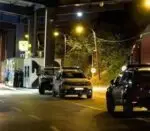The United States and the European Union need to change their approach to the dialogue if they want to see progress. This is the view of Professor at Johns Hopkins University and Balkan expert, Edward Joseph.
Joseph says that Kosovo cannot continue to be punished while Serbia is coddled, as this approach is not working. He emphasizes the close relations between Serbia’s President Aleksandar Vučić and Russian President Vladimir Putin, and argues that the West has never put President Vučić in a position of choice: “Either you are with us or with Russia.”
Joseph explains that one of the things that must change is the US and the EU’s stance of holding only Kosovo accountable and doing nothing about Serbia. He argues that this has to change if there is any hope of real progress.
Full Interview:
Donald Trump Returns to the White House. What Does This Mean for the Western Balkans, Especially for Kosovo-Serbia Relations?
“Everyone wants to know the answer to this question. And my answer is different from others. I focus on Trump himself and his concept of self. He is proud of the fact that he is unpredictable. This is his main characteristic in international matters—the unpredictability. So, the answer to your question is: we don’t know. And I challenge those who say nothing will change with Trump or that things will change. We don’t know the answer. He is a very unpredictable character, and I think we need to watch closely. We need to look at his appointments. I think the appointment of Secretary of State Marco Rubio suggests a level of normality in US foreign policy, but still, Trump himself could be unpredictable. So, it’s too soon to give a full answer.”
The Kosovo-Serbia Dialogue Seems to Be Stalled. Do You Think There Could Be New Dynamism and a New Final Agreement Under Trump’s Mandate?
“We don’t know. But what we do know is that in order to have a real solution, such as the implementation of a normalization agreement, things need to change. Some things must change because it’s clear that what has been attempted so far has not worked.”
So, what needs to change?
“One thing that needs to change is that the US and the EU cannot continue to hold Kosovo accountable and not Serbia. This cannot continue. If the US and the EU truly want progress, they cannot impose measures on Kosovo and do nothing about Serbia, signaling to Serbia and President Vučić that they don’t bear responsibility or bear responsibility in the minimal ways. This needs to change. But in order to reach an agreement, both the US and the EU must take this much more seriously. They must take seriously the fact that a leader of a country refuses to sign this agreement.”
“Serbia’s prime minister sends a letter stating that the agreement is not legally binding. You cannot expect progress with this kind of attitude. And lastly, the atmosphere within Kosovo must improve, particularly the atmosphere with Kosovo’s Serbs. I want to repeat, this is in the strategic interest of Kosovo to improve and show both Serbs in Kosovo and the US and the EU that the Government of Kosovo truly sees Serbs as first-class citizens of Kosovo.”
The European Union now has new leaders, including Kaja Kallas. Do you expect a different approach to the dialogue in order to succeed?
“Again, here I can’t predict anything specific. What I can say is that it is encouraging that former Prime Minister Kallas comes from a country that knows Kosovo. This is very important. Her predecessor, Borrell, was from Spain, a non-recognizing country. This is already very significant. Secondly, former Prime Minister Kallas, who will lead EU foreign policy, comes from a country on the front line with Russia. She absolutely understands the threat from Russia, the threat from pro-Russian narratives that come from countries in the region that want to balance their relations and continue to have a good relationship with Russia without imposing sanctions. I think former Prime Minister Kallas will not want to coddle countries that refuse to impose sanctions on Russia.”
Last question: Next year, President Aleksandar Vučić might visit Russia with Vladimir Putin. What would this mean? What message does it send?
“Well, I don’t know if this has been confirmed. That’s the first point. We don’t know yet. I know there is an invitation for President Vučić to attend the anniversary of the end of World War II. But honestly, we don’t know if he will participate. He didn’t attend the BRICS summit in Kazan. But what we do know is that Aleksandar Vulin has been to Russia. Ivica Dačić has recently been to Russia. We know that the relationship remains very positive. We know there are pro-Russian narratives here in Belgrade, that media like Russia Today and Sputnik have been invited to security conferences.”
“And we know that these narratives spread throughout the Balkans, especially in countries that understand Serbian. So, we know that part, and we know, of course, that Serbia has not imposed sanctions on Russia.”
It seems that Serbia is closer to Russia now…
“Well, look, I consider this balance to be false, like a game. The US and the EU see the strategic importance of Serbian ammunition going to Ukraine and the strategic importance of lithium going to the West. Serbian ammunition in Ukraine and Serbian lithium in the West are strategic. Unfortunately, neither the US nor the EU has approached Serbia the way they approached all the countries in the region when Vladimir Putin attacked Ukraine. The US and the EU did not ask President Vučić, they didn’t say to him, ‘Now is the time for you to decide, are you with us or are you with Vladimir Putin?’ Unfortunately, this question was never asked.”







